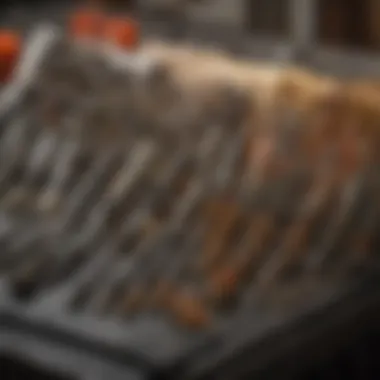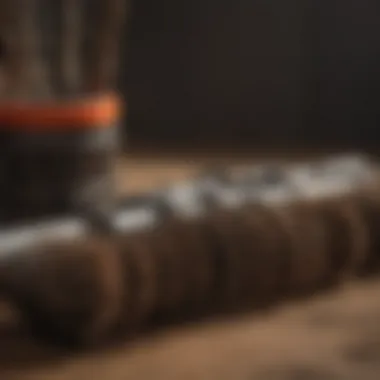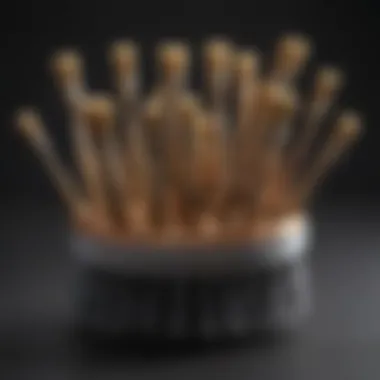Comprehensive Guide to Wire Tube Brushes at Home Depot


Intro
Wire tube brushes are essential tools for numerous applications, especially for those engaged in agriculture and horticulture. These brushes help maintain equipment by ensuring thorough cleaning of tubes and pipes, which can significantly improve performance and longevity. Understanding the various types and uses of these brushes can enhance efficiency in farm operations and related activities.
In this guide, we will explore wire tube brushes available at Home Depot, discussing their specifications, practical applications, and the significance of proper maintenance. By diving deep into each aspect, readers will gain insights that help in making informed purchasing decisions and using these brushes effectively in their tasks.
Prologue to Wire Tube Brushes
Wire tube brushes are essential tools that serve specific purposes across various sectors. Their design is integral in achieving effective cleaning for both specialized equipment and common household items. This section highlights why understanding wire tube brushes is critical.
Home Depot offers a wide selection, catering to diverse consumer needs ranging from agriculture to domestic maintenance. Grasping the attributes of these brushes can greatly assist customers in making informed purchasing decisions, ensuring they select the correct tool for their tasks.
Definition and Purpose
Wire tube brushes are cleaning tools characterized by a bristle-filled design, often composed of wire strands. Their primary purpose is to clean and maintain cylindrical surfaces, such as pipes and tubing. The bristles, typically made from materials like steel or copper, work effectively to remove debris, carbon, or oxidation that can accumulate over time.
These brushes are utilized across various applications, from industrial settings to household cleaning tasks. For instance, in agriculture, wire tube brushes can help maintain irrigation systems by keeping pipes free of blockages. In homes, they can be invaluable for cleaning the insides of tools and equipment that require regular maintenance.
Historical Context
The development of wire tube brushes has its roots in the evolution of cleaning tools. Historically, tools for cleaning evolved as the need for maintaining and repairing machinery increased. The concept of wire brushes can be traced back to the industrial revolution when cleanliness became crucial for machine efficiency. From early designs with simple wire bristles, they have transformed into specialized tools widely used today.
Over the decades, advancements in materials and manufacturing techniques improved the durability and effectiveness of these brushes. Their historical importance is evident; the tools have been integral in various sectors, enhancing both productivity and the lifespan of equipment utilized in agriculture, manufacturing, and even within households. Understanding this context adds depth to the appreciation of wire tube brushes available at Home Depot, linking past innovations to current applications.
Types of Wire Tube Brushes Available at Home Depot
Understanding the different types of wire tube brushes available at Home Depot is vital for anyone seeking the right cleaning tools. These brushes serve a variety of functions, and the right choice can enhance effectiveness in your tasks. This section will explore the material composition and design variations of wire tube brushes, detailing the unique characteristics and benefits of each type.
Material Composition
Copper Wire Brushes
Copper wire brushes are often favored for their excellent ability to remove corrosion and rust. Copper is softer than steel, which means it is less likely to scratch or damage delicate surfaces. This makes copper wire brushes a beneficial choice for cleaning and preparing painted or sensitive metallic surfaces. The key characteristic of copper wire brushes is their resistance to tarnishing, contributing to a longer lifespan and consistent performance.
One unique feature of copper wire brushes is their conductivity, which can be advantageous in specific applications that require an electrical connection. However, they may not be suitable for all types of heavy-duty cleaning. They tend to wear out faster under extreme pressure or abrasive tasks, leading to considerations about their use depending on the project at hand.
Steel Wire Brushes
Steel wire brushes are known for their durability and ability to handle tough cleaning jobs. They are particularly effective at removing rust, paint, and debris from metal surfaces. These brushes are a popular choice due to their strength and resistance to wear and tear. The key characteristic of steel wire brushes is their ability to withstand higher levels of stress without deforming, making them ideal for heavy-duty applications.
A unique feature of steel wire brushes is their capacity to clean larger areas more quickly than softer brushes. They can easily tackle heavy corrosion, but one drawback is that they can scratch softer metals. Therefore, users must ensure they select the right brush to avoid damage to the surface being cleaned.
Nylon Wire Brushes
Nylon wire brushes offer a gentler alternative for cleaning tasks. They are designed to be less abrasive than metal brushes, making them suitable for various applications, including cleaning plastic and wood surfaces. The key characteristic of nylon wire brushes is their flexibility, allowing them to conform to different shapes and angles during cleaning.
One significant advantage of nylon brushes is their ability to be used in wet conditions. They resist moisture better than metal brushes, preventing rust and prolonging their life. However, nylon brushes are typically not as effective for heavy-duty tasks that require more aggressive cleaning. Their use should be more focused on delicate surfaces, where less abrasiveness is essential.


Brush Design Variations
Twist Knot Brushes
Twist knot brushes consist of wires twisted together, which results in a dense and heavy cleaning surface. They are known for their strength and are particularly effective in removing heavy deposits from surfaces. This design allows for solid performance even under challenging conditions. The key characteristic of twist knot brushes is their ability to reach into tight spaces while providing robust cleaning action.
A unique feature of twist knot brushes is their versatility in different applications, from industrial to home use. However, they can be too aggressive for some surfaces, leading to potential damage. Care should be taken to assess the suitability of this type for the task at hand.
Sewed Brushes
Sewed brushes are characterized by their bristles being sewn into a base. This construction offers a more controlled bristle arrangement, making them ideal for specialized tasks. They perform well in applications that require precision cleaning. The key characteristic of sewed brushes is their ability to retain bristle shape over time, ensuring consistent performance.
A unique feature of sewed brushes is their use in both manual and machine applications. They can effectively clean in confined areas, but they may not handle heavy debris as well as metal brushes. Thus, they are often recommended for finer, more detailed work.
End Brushes
End brushes are designed with bristles that extend out from one end, making them suitable for cleaning inside tight spaces and contours. This design provides accessibility to areas that might be difficult to reach with standard brushes. The key characteristic of end brushes is their specialized shape, which facilitates effective cleaning in complex areas.
A unique feature of end brushes is their ability to clean precision components, which is valuable in both automotive and machinery maintenance. However, their narrower cleaning surface might not be as effective for broader cleaning tasks. Users should consider the specifics of their project when selecting this type of brush.
Choosing the right type of wire tube brush is essential for maximizing cleaning efficiency in various applications. Assess each type's specific design and material to find the ideal tool for your job.
Applications of Wire Tube Brushes
Wire tube brushes have a prominent role across various sectors, demonstrating their versatility and efficiency in both industrial and household applications. Understanding these applications provides clarity on how wire tube brushes can contribute significantly to equipment maintenance and cleaning, ultimately promoting better functioning and longer lifespans of the tools and machinery involved.
Industrial Uses
Cleaning Machinery
Cleaning machinery is an essential task in maintaining operational efficiency. Wire tube brushes are highly effective in this context. They can reach narrow spaces and difficult angles, where standard cleaning methods often fail. This is especially important for machines that work with oils, greases, or other residues that can accumulate over time.
One key characteristic of wire tube brushes used for cleaning machinery is their durable bristle design. These brushes withstand rigorous use and harsh environments, making them a reliable choice. Moreover, they help in reducing downtime due to maintenance, which is a critical factor in industrial operations. Therefore, using wire tube brushes can lead to cost savings and increased productivity in the long run.
The unique feature of wire tube brushes in cleaning machinery is their ability to adapt to different types of surfaces. They can effectively clean both smooth and rough surfaces without causing damage, which is a significant advantage. However, one needs to be cautious about the type of wire used, as an incorrect choice can lead to wear on delicate machinery parts.
Assembly Lines
In assembly lines, efficiency is key, and wire tube brushes play an important part in maintaining this efficiency. These brushes are used for cleaning parts that are then assembled into final products. Keeping these parts clean ensures that the quality standards are met, which is crucial in manufacturing.
The key characteristic of wire tube brushes in assembly lines is their ability to function quickly and effectively. They are designed to remove dust, debris, and other contaminants that may hinder production. The use of such tools helps reduce defects and enhances the overall manufacturing process.
A notable feature of wire tube brushes in assembly lines is their compatibility with automated cleaning systems. This integration allows for continuous cleaning during the assembly process, thus fostering a smooth flow of operations. However, it is essential to maintain the brushes regularly to ensure they function optimally, or inefficiencies may arise in the cleaning process.
Household Uses
Cleaning Pipes
Cleaning pipes is another significant application for wire tube brushes. They are particularly useful for home maintenance tasks involving plumbing or HVAC systems. Clogged pipes can lead to inefficient systems and potentially costly repairs.


Wire tube brushes designed for cleaning pipes are beneficial due to their flexible sizes and capability to reach deep into pipes where debris accumulates. They effectively remove buildup and restore proper flow, which is vital for maintaining a functioning system.
A unique feature of these brushes is their ability to contour to the inside of various pipe diameters. Nevertheless, care must be taken to select the right size and material to avoid damaging the pipes, especially in older systems.
Maintaining Tools and Equipment
Maintaining tools and equipment is crucial for any household, whether for gardening, DIY projects, or other tasks. Using wire tube brushes to clean tools helps prolong their life and enhances their performance.
The key characteristic of wire tube brushes when maintaining tools is their ability to dislodge rust, dirt, and other contaminants. This not only keeps the tools in good working condition but also ensures safety during use.
A unique benefit of these brushes is their ease of use; they can be used on various types of tools without much hassle. However, different tools might require specific brushes, so it’s important to have a suitable collection on hand.
Applications in Agriculture and Horticulture
Cleaning Irrigation Systems
In the agricultural sector, wire tube brushes are instrumental in cleaning irrigation systems. They help ensure that water flows evenly and without obstruction, which is crucial for healthy crop growth.
One notable characteristic of using these brushes in irrigation systems is their ability to remove mineral deposits and biofilm that can build up over time. Keeping irrigation systems clean allows for better water distribution and improves overall plant health.
The unique feature of using wire tube brushes is their adaptability. They can be used on a variety of irrigation types, from drip to sprinkler systems. However, it is critical to use the appropriate brush type to avoid damage to more delicate components.
Preparing Garden Tools
Before the planting season, preparing garden tools is essential. Wire tube brushes excel in cleaning tools that may have accumulated soil, plant residue, or rust. Such maintenance is necessary to ensure efficient garden work and to prevent the spread of disease among plants.
A key characteristic of using wire tube brushes for garden tool preparation is effectiveness; they can quickly remove stubborn dirt. They are also simple to use, making them accessible even for those with little cleaning experience.
A unique feature of these brushes is their variety of sizes, allowing them to clean various tools effectively, from hand trowels to larger equipment. But care should be taken when using them on sharper tools to avoid damaging any cutting edges.
Buying Considerations for Wire Tube Brushes
When purchasing wire tube brushes, there are several critical factors to consider. Understanding these aspects helps in selecting the right brush for specific tasks. A proper choice enhances performance and efficiency across various applications, from household cleaning to industrial uses. Keeping in mind the specifications like size, bristle material, thickness, and costs can greatly inform purchasing decisions and improve overall satisfaction with the product.
Size and Shape Considerations
Choosing the Right Diameter
The diameter of a wire tube brush plays a significant role in its effectiveness. Brushes with a smaller diameter are ideal for tight spaces, allowing for thorough cleaning inside narrow tubes and pipes. Conversely, larger diameter brushes are suitable for broader applications.
When considering choosing the right diameter, it is crucial to assess the specific needs of the task at hand. For example, if you are cleaning a widely used irrigation tube, a brush that closely matches the tube's inner diameter can provide optimal results. Selecting the appropriate size can prevent wear on both the brush and the surface being cleaned. Additionally, a well-fitted brush might reduce cleaning time and improve efficiency.
Length Options
Length is another aspect that should not be overlooked when selecting a wire tube brush. Longer brushes can reach deeper into pipes and tubes, making them advantageous for accessing hard-to-reach areas. On the other hand, shorter brushes might allow for better control during use, especially in confined spaces.
Opting for a brush with the right length can aid in maximizing its utility. However, too long of a brush may lead to less handling control, which could result in scratches or damage to the inner surfaces being cleaned.


Bristle Material and Thickness
The bristle material contributes significantly to the effectiveness and durability of wire tube brushes. Common materials include copper, stainless steel, and nylon. Each material has distinctive qualities that affect performance and application suitability.
- Copper wire brushes: Best for softer materials. These are effective for cleaning delicate surfaces without causing scratches.
- Steel wire brushes: Extremely durable and effective for heavy-duty cleaning tasks. They offer higher resistance to wear and tear but can be harsh on softer materials.
- Nylon wire brushes: These are ideal for more controlled cleaning applications. They are less aggressive and can be used for scrubbing without damaging the surface.
The thickness of bristles also varies and should match the cleaning requirements. Thicker bristles generally provide more scrubbing power, whereas finer bristles can clean delicate surfaces without compromising their integrity.
Cost Analysis
Budget considerations are always critical when buying any tools, including wire tube brushes. Prices can fluctuate based on factors such as material, size, and brand. It’s important to evaluate what you need in terms of quality and durability. Cheaper brushes might save money upfront but can lead to additional costs due to replacements or inefficiency in cleaning tasks.
Investing in a mid-range or slightly higher quality brush may provide better longevity and performance. Analyzing the costs associated with different brushes can lead to a more informed purchasing decision, ultimately saving money in the long run.
Always consider the balance between cost and functionality. A well-chosen wire tube brush can make a significant difference in the effectiveness of cleaning tasks while ensuring the longevity of the tools being maintained.
Maintenance of Wire Tube Brushes
The maintenance of wire tube brushes is crucial for their performance and longevity. Proper upkeep can improve the efficiency of your cleaning tasks and ensure that the brushes remain effective over time. Neglecting this aspect can lead to a decline in performance, which could compromise the tasks they are meant to assist with. Regular maintenance not only preserves the integrity of the bristles but also extends the lifespan of the brush itself. Understanding how to maintain these tools is essential for anyone looking to maximize their utility, especially in demanding environments such as agriculture and industrial settings.
Cleaning Techniques
Regular Cleaning Schedules
Implementing a regular cleaning schedule is one of the best practices you can adopt for maintaining wire tube brushes. Cleaning them after each use helps prevent the buildup of dirt and debris. This method is beneficial because it keeps the brushes in optimal condition, allowing them to perform effectively during future tasks. One key characteristic of a regular cleaning schedule is its simplicity. Just a quick rinse or wipe right after use can make a significant difference. Additionally, scheduling cleaning at specific intervals—like weekly for brushes used in industrial applications—can ensure consistency.
The unique feature of a regular cleaning schedule is its preventative nature. By addressing dirt accumulation regularly, you can avoid costly repairs or replacements down the line. However, one disadvantage might be that it requires discipline. Users must remember to clean the brushes consistently, or else the effectiveness may diminish over time.
Proper Storage Practices
Proper storage practices play an important role in maintaining wire tube brushes. Storing brushes in a dry, cool place protects them from moisture and harsh elements that could cause rust or wear. An orderly storage method not only keeps the brushes safe but also makes them easily accessible for when you need them. A key characteristic of proper storage is that it minimizes contact with abrasive materials or surfaces, which can damage the bristles.
Another unique feature of good storage practices is compartmentalization. By separating different types of brushes, you can prevent cross-contamination and abrasion. This method is particularly advantageous in environments where brushes serve multiple purposes. On the downside, if storage requires too much space or excessive organization, it could lead to inconvenience for users who prefer a quick grab-and-go approach.
Signs of Wear and Replacement
Recognizing signs of wear in wire tube brushes is vital for maintaining their effectiveness. Over time, bristles can become frayed or lose their stiffness, reducing their cleaning capability. Regular inspections should focus on these indicators of degradation. If a brush shows significant bristle wear or bending, it may be time for replacement. Ignoring these signs can lead to inefficient cleaning and potential damage to the surfaces being cleaned.
In summary, the maintenance of wire tube brushes involves regular cleaning and proper storage to prolong their life and enhance their performance. Users should also stay vigilant for signs of wear to ensure they replace brushes as necessary. This ongoing attention is well worth the investment in time and effort, as it contributes significantly to the tools' overall effectiveness.
Culmination
Wire tube brushes serve as essential tools in both industrial and household contexts. This article has provided a thorough overview of their various types, uses, and maintenance practices, all of which are vital for effective operation. Here, the significance of wire tube brushes is highlighted by several key elements.
Summary of Key Points
- Variety of Types: Wire tube brushes come in different materials such as copper, steel, and nylon, each suited for particular applications.
- Diverse Applications: These brushes are not only useful in industrial settings but also play a critical role in household tasks, agriculture, and horticulture.
- Buying Factors: Key considerations when purchasing include size, shape, and bristle material, all of which affect performance.
- Maintenance Importance: Regular cleaning and proper storage are crucial for extending the lifespan of wire tube brushes.
- Replacement Indicators: Recognizing the signs of wear is essential to ensure that the brushes maintain their effectiveness.
Final Thoughts on Usage and Selection
Selecting the right wire tube brush is critical for optimizing cleaning efficiency. Depending on the task, various brushes may be preferable. For instance, copper wire brushes are effective in removing rust, while nylon brushes can protect delicate surfaces.
In agriculture, maintaining clean irrigation systems and tools is paramount. Properly choosing the right brushes ensures that equipment functions optimally, preventing potential downtime. Ultimately, understanding the specific requirements of your task will help you select the best wire tube brush for the job.
With the insights gained from this article, you can approach your projects with increased knowledge and confidence in your tool selection. Remember to prioritize maintenance and proper usage to get the best results from your wire tube brushes.







